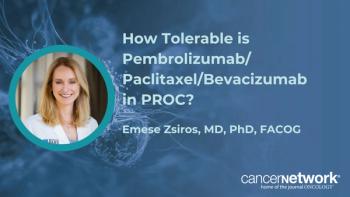
Small Study Shows Promise of a Vaccine for Metastatic Breast and Ovarian Cancer
Breast and ovarian cancer patients with limited tumor burden and minimal prior chemotherapy appear to have benefited from a novel vaccine.
Breast and ovarian cancer patients with limited tumor burden and minimal prior chemotherapy appear to have benefited from a novel vaccine, according to trial results just published in Clinical Cancer Research (doi: 10.1158/1078-0432.CCR-11-0649).
The vaccine, PANVAC, is a recombinant poxviral vaccine that expresses two tumor-associated antigens, carcinoembryonic antigen (CEA) and mucin-1 (MUC-1) as well as three costimulatory molecules. According to the lead author of the study, James Gulley, MD, PhD, director and deputy chief of the clinical trials group at the Laboratory of Tumor Immunology and Biology at the NCI, CEA is overexpressed in a wide number of commonly occurring tumors such as colon, breast, rectal, pancreatic, and lung, among others. MUC-1 is overexpressed in even more cancers. “CEA is found in about 50% of breast cancers but is rare in ovarian. MUC-1 is found in the vast majority of both cancers,” said Gulley.
The pilot trial to demonstrate efficacy enrolled 26 heavily pretreated patients-the vast majority of who had three or more prior chemotherapy regimens-who received monthly vaccinations. For the 12 breast cancer patients, the median time to progression was 2.5 months and the overall median survival was 13.7 months. One patient had a complete response, remaining on the trial for over 37 months. Four patients had stable disease and one patient exhibited responding disease.
Among the ovarian cancer patients, the median time to progression was 2 months and the median overall survival was 15 months. One patient from the previous safety trial had a time to progression of 38 months. The side effects were mostly mild injection-site reactions. “With this vaccine, we can clearly generate immune responses that lead to clinical responses in some patients,” said Gulley in a press release.
“I think the reason we haven’t seen many responses is because the patient populations we've used in the past were too advanced, and had too many prior chemotherapy regimens. In addition, I think that the main activity of a therapeutic vaccine may be to eventually slow down the growth rate of cancers. [A response is caused in relatively few patients.] A delay in the slowing of the growth rate may be due to continued refinement and broadening of the immune response following vaccination. This could explain why multiple randomized studies have shown an improved overall survival without initial improved time to progression,” said Gulley.
This trial, and especially the over 3-year sustained response of a patient with advanced breast cancer shows the potential of a therapeutic vaccine for improved outcomes in a selective subset of patients. Importantly, this type of response could be achieved with little toxicity. Future trials need to focus on selecting the most responsive patient population and refining the timing of vaccine delivery in terms of stage of disease.
“We think that selecting patients with fewer prior chemotherapy regimens, slower growing tumors and lower tumor burden will most likely to lead to improved outcomes in patients treated with vaccines, while we do not expect any clinical benefit in patients with more advanced disease,” said Gulley. The researchers are actively looking for biomarkers to refine the target patient populations.
Newsletter
Stay up to date on recent advances in the multidisciplinary approach to cancer.












































